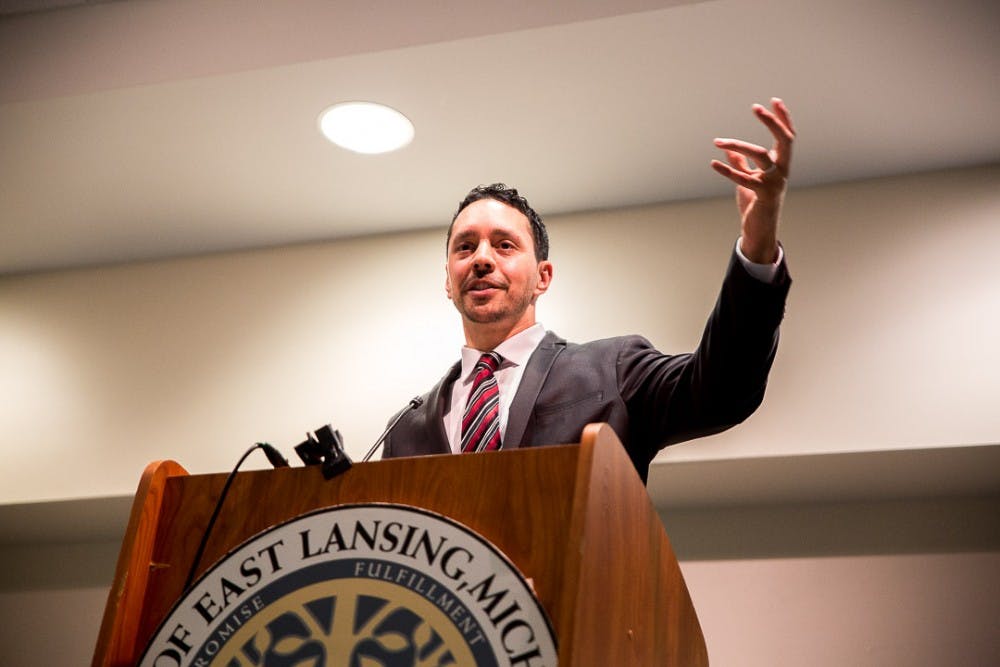Community members shared conversation on topics from gun violence to immigration at the "Face to Face: A Conversation About Bans, Walls and Mass Shootings” event Wednesday night at the East Lansing Hannah Community Center.
The panel was made up of five local residents, including Michigan State faculty members and a senior at Okemos High School.
The program aimed to create an environment in which conversation and opinions could be shared not just by the panel, but by audience members as well. The event was designed to make international events more relatable rather than simply retelling what happened.
“I think it’s really important for people to hear others narrate their own stories; to talk about events that are traumatic or problematic or controversial through their own perspective instead of somebody else doing the retelling,” said Dorinda Carter-Andrews, Associate Dean for Equity and Inclusion with MSU's College of Education.
Each panelist had 10 minutes for their opening remarks, which was then followed by a question-and-answer session. The panelists' opening statements told stories of prejudice they’ve experienced.
Okemos High School senior Amira Rinker opened the discussion by performing a spoken-word piece she wrote after visiting Marjory Stoneman Douglas High School in Parkland, Florida. A gunman killed 17 students and staff members at the school in February 2018.
She was followed by Dr. Yael Aronoff, an associate professor in MSU's James Madison College with a focus in Israeli studies. She gave examples of anti-Semitism she and her family face in their daily lives, and listed prejudiced comments often said to Jewish people.
Aronoff noted that recipients of prejudice are not immune to being prejudiced themselves.
“We have to look at our own political, ethnic and religious communities, and call our own communities out when we hear prejudice and prejudicial statements against others,” she said. “Sometimes that’s even harder to do when it comes from our own families or friends or colleagues or people who think like us.”
Aronoff was followed by Oscar Castaneda, the civil rights for immigrants task force chair for Action of Greater Lansing and a Guatemalan immigrant in the U.S. on a work permit. Casteneda, who has lived in Lansing for more than two decades, discussed his struggles with the immigration system.
“We’ve been living in a broken system for a long time. It needs to be fixed,” he said. “It needs to be fixed in a compassionate way.”
Dr. Mohammad Hassan Khalil, director of MSU's Muslim Studies program, then explained the prejudice he and his family face as practicing Muslims. He also discussed the lack of security he feels as a Muslim man, especially after the New Zealand mosque shooting that left 50 dead.
“I’ve never seen our local mosque beef up on security like they are now,” he said. “I remember in the '90s you just walked right in, whatever, anytime, no worries. Now, there's an ADT (alarm system) sign; we have two ADT signs in case you missed the first one.”
He touched on the fact that there are security guards in his mosque, which leads him to feeling threatened in his own place of worship. However, he ended by saying events like the community panel that allow discussion give him hope.
“I began by saying as a U.S. Muslim I have never felt more threatened than I do today, and yet as a U.S. Muslim I’ve never felt as welcome as I do today," he said. “I say this because of gatherings like this.”
To end the event, Dr. Farhad Abbasi, head of the Muslim Mental Health Conference, took to the podium to discuss her experiences as a Muslim woman in the U.S. She spoke of association and implicit biases and how the portrayal of various groups in media, politics and rhetoric influence people and can result in prejudices.
“If love is a learned experience, hate is as well,” Abbasi said.
By discussing topics that often lead to discomfort, progress can be made and awareness can be spread, Carter-Andrews said.
“It’s in our discomfort where we grow, and I think it’s a part of the human existence to want to hold onto those deeply held values and beliefs that you have and that you have been taught,” she said. “But sometimes those values and beliefs are problematic, and so hearing other people's lived experiences — hearing their truths — either helps you become more defensive around your position or helps you learn how to change that position in ways that really contribute to us being a stronger, healthier and loving society,”
Support student media!
Please consider donating to The State News and help fund the future of journalism.
Discussion
Share and discuss “Residents air hopes for, grievances with society at panel discussion” on social media.







